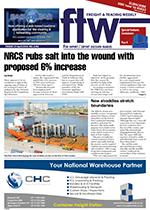The advent of autonomous vessels – expected as early as 2020 – will usher in a host of operational and regulatory challenges, according to Shepstone & Wylie partner, international transport, trade and energy department, Quintus van der Merwe.
“There is not an aspect of shipping that will not be affected,” he said. “Talking through the process of a ship loading at a port, sailing across the sea and arriving at the port of destination, you would have to consider who would issue a bill of lading when the cargo is loaded.”
He said that even the terms of the bill of lading would change as provisions relating to the Master of the ship and the crew would no longer apply – along with the reporting obligations of the Master on departure from the port.
“The same issues will aride on the vessel’s arrival at its port of destination where current reporting obligations and the potential for liability for things like pollution or customs formalities generally fall on the Master.
“Various international conventions, which are incorporated into our domestic law in some form, like Safety of Life at Sea (Solas), watchkeeping obligations, collision regulations and the like, would need to be reviewed,” he added. “Insurance of the vessel as well as cargo insurance would need to be reconsidered and no doubt new clauses would start appearing in policies.”
Divisional director at marine insurance broker Prestmarine, Susan Duvenage, told FTW that it was still very “early days” and that knowledge of the possible impact on liabilities was not reliable.
Van der Merwe also pointed out that the potential for cybercrime, not only in hacking the vessel but affecting its steering and course, would demand some sort of regulation as it had massive ramifications.
“If there are no crew on board and it is truly an autonomous vessel, then they may be somewhat more susceptible to stowaways or even the potential of terrorism,” he said.
While many in the industry believe autonomous shipping will likely reduce or mostly eliminate the issue of piracy along trade routes, Van der Merwe said that the potential for piracy could differ vastly on an unmanned vessel as opposed to a vessel where there was a crew to keep watch.
“There is no doubt that new clauses and potentially new laws may arise in respect of things like piracy.”
However, on a positive note, he said autonomous shipping would lead to a saving on the wage bill, it would eliminate claims arising due to human error and cut down on the large number of crew injury claims.
CAPTION
Rolls Royce believes the first remote-controlled ocean-going vessel will make its entry around 2025 and quickly become commonplace by 2030.

